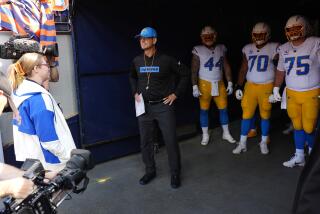Athletes Turning to Psychologists to Get an Edge
- Share via
A prominent New York sports psychologist was called to Atlanta to see what he could do for a slumping baseball player who was on a road trip with his team. After a long talk, the psychologist decided that the player was a good subject for hypnosis.
“Here we were in Fulton County Stadium, looking for a quiet spot,” the psychologist said. They found the laundry room. There, on the floor, the psychologist had the “fairly prominent” player lie down. To the surprise of the equipment manager, busy washing, the psychologist hypnotized the player.
“It happened that the player was traveling with his wife, who was pregnant with their first child,” the psychologist said. “There was also a lot of pressure on him to carry the team with his hitting.”
It was classic: Feeling the pressure, the player was pressing. And when he pressed, his hitting suffered.
So the psychologist took the player into a subconscious batting cage, a pressure-free environment. Step by step, he set the player in his batting stance, and they hit some imaginary baseballs.
There’s the good swing.
When the player came out of his trance he had a good-swing video entrenched in his mind. He was instructed to use that video during games, to run through it when he stepped into the batter’s box when 40,000 people were screaming.
According to the psychologist, it worked. The player went on a tear for the rest of the season. Such cases of applying psychology to sport are not the norm nowadays, but could be in the near future. In the upper echelons of sport, where skills are often evenly matched, many experts agree that mind-set is the key factor in separating good from great performances. And athletes of all kinds, from divers to decathletes to duffers on the golf course, are looking for an edge.
Sports psychology began to blossom about 10 years ago. Now, most major universities offer courses in the discipline.
The U.S. Olympic Committee has a subsection devoted to sports psychology. And there is no professional team today that has not sought psychological services of one form or another.
Bruce Ogilvie, the American pioneer in this field, helped convince some National Football League owners of his worth in the mid-’60s. Ogilvie questioned a number of rookies, then predicted five or six who were likely to succumb to pressure. Invariably, Ogilvie was right. Several players he had identified asked to leave training camp.
Drug and alcohol abuse counseling also fall under sports psychology. But perhaps the most intriguing aspect of this burgeoning field is performance enhancement.
Sports psychologists believe that they can help athletes discover a method that gives them more mental and emotional control, allowing them to perform to their peak physically. In other words, give them their own mental edge.
“Long before mechanics are lost, the psychological part has been lost,” said Bert Burke, a New Jersey psychologist who began working with athletes 15 years ago. “We’ve always done too much on the physical side and not enough on the mental side. Actually, they’re interchangeable. And one of the offshoots of this is that when people are going well, they’re starting to talk about how it feels. That can breed, just like a slump can breed.”
More to Read
Go beyond the scoreboard
Get the latest on L.A.'s teams in the daily Sports Report newsletter.
You may occasionally receive promotional content from the Los Angeles Times.







